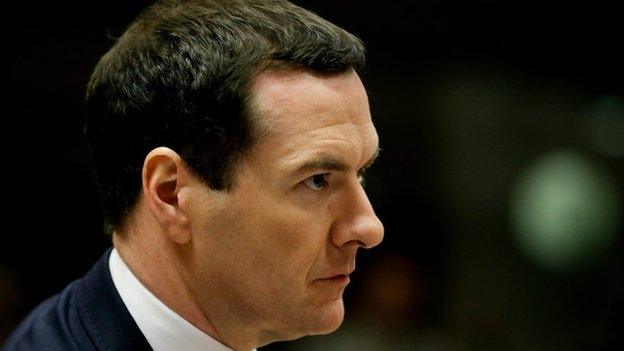What do UK firms think about a possible 'Brexit'?
- Published
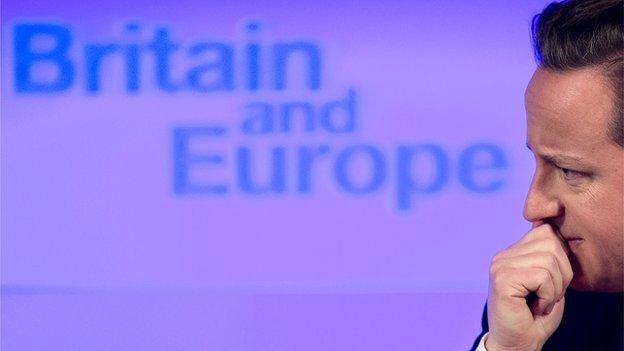
Could the prime minister's in-out referendum on EU membership "backfire"?
Prime Minister David Cameron has promised an in-out referendum on the UK's membership of the European Union before the end of 2017.
Most business lobby groups seem to be broadly in favour of staying in a reformed EU, and their member surveys reflect this view.
But what is the reality of doing business with Europe? Is there too much red tape and bureaucracy? What effect could a Brexit - the inelegant short-hand for Britain leaving Europe - have on UK businesses?
The BBC canvassed a variety of businesses for their views.

Name: Tony Attard
Position: Group chief executive
Company: Panaz, based in Burnley, Lancashire
Size: £15m annual turnover; about 100 employees
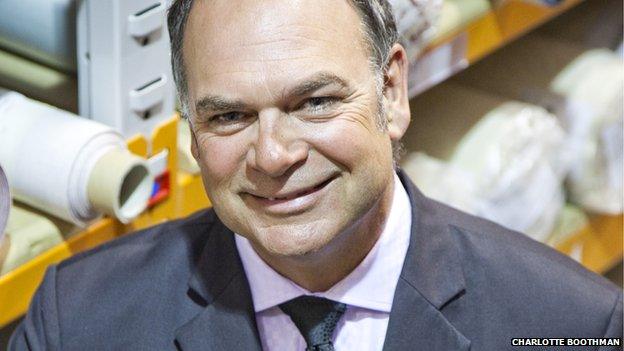
Tony Attard says pulling out of Europe "would cost jobs without a doubt"
"We export about £3m of goods a year to Europe - it's an incredibly important market for us," says Tony Attard, boss of a 30-year-old company making textiles for hotels, hospitals and offices.
"If we pulled out and I lost £2m of business it would cost jobs without a doubt. It's a big threat."
Standard product testing and harmonisation of raw materials tariffs have been beneficial for his business, he says, as have pan-European trade agreements.
"It's a ridiculous thing to say that being out of Europe would make us more competitive and nimble. We shouldn't take if for granted that we would have access to an open market if we pulled out."
Regulatory red tape from Brussels is often cited as a frustration for business, particularly when it comes to employment law and health and safety issues.
But Mr Attard says: "UK business rates are more of an issue to us than the working time directive."

Panaz makes textile products for hotels, hospitals and offices

Name: John Mills
Position: Founder
Company: JML Group, London
Size: £100m annual turnover; 350 employees

John Mills thinks a referendum on EU membership will help us make up our minds "once and for all"
"We really need a referendum to make up our minds once and for all whether we're going to be in Europe and make a go of it, or go our separate ways," says John Mills, founder of global consumer products company JML Group.
The Labour party donor and co-chairman of lobby group, Business for Britain, external, says: "I don't think it would make much difference economically if we were in or out, but I'm quite open minded on the issue.
"I just think we need to change our terms of membership and repatriate some powers from Brussels to Westminster. I don't think Britain wants to be part of a 'United States of Europe'."
The costs of membership, at £14bn-£15bn a year, are too high, he adds, while some of the regulations coming from Europe "can make business less competitive".

Name: Lesley Moody
Position: Managing director
Company: AES Digital Solutions, Billingham, Teesside
Size: Less than £1m annual turnover; seven employees

Lesley Moody fears UK business being "drowned in EU red tape"
"I want to have my cake and eat it," admits Lesley Moody, boss of a digital media company developing software for local government and the food and beverage industry.
"I favour being involved in Europe, but I don't want to be drawn further in," she says.
With many of her customers based in Europe, she accepts that a single market is beneficial, but says: "I want us to be able to have a say but be able to opt out when they propose something that's not in our interests."
She fears being "drowned in EU red tape", and hopes that the proposed Transatlantic Trade and Investment Partnership being negotiated between the EU and the US could put some UK businesses at a competitive advantage.

Name: Tim Squires
Position: Commercial director
Company: Squires Gear & Engineering, Coventry
Size: £1.2m annual turnover; 16 employees

Tim Squires says "this referendum could really backfire"
"This referendum could really backfire," says Tim Squires, commercial director of a family firm making machine parts for the automotive industry. "The lack of information has clouded a lot of people's judgement."
"Although we're not a huge exporter, a lot of our parts go into products that are then sold to Europe, so import duties would be a big issue if we left the EU."
But Mr Squires, along with many other smaller businesses, thinks the UK pays a lot into the EU but doesn't seem to get enough back in return. And he thinks there's too much confusion over which legislation comes from Brussels or Westminster.
That said, remaining part of the European club brings more benefits than disadvantages, he believes.
"The EU is our biggest trading partner and if we're not in that we're going to be left out in the cold."
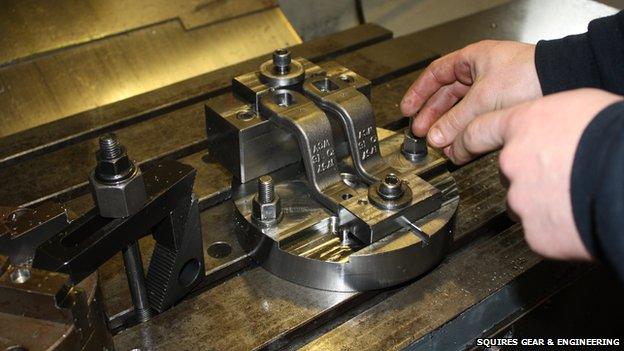
Coventry-based Squires Gear & Engineering makes parts for the automotive industry

Name: Geoff Billington
Position: Sales director
Company: International Safety Products, Bootle/Birkenhead, Merseyside
Size: Less than £15m annual turnover; 120 employees
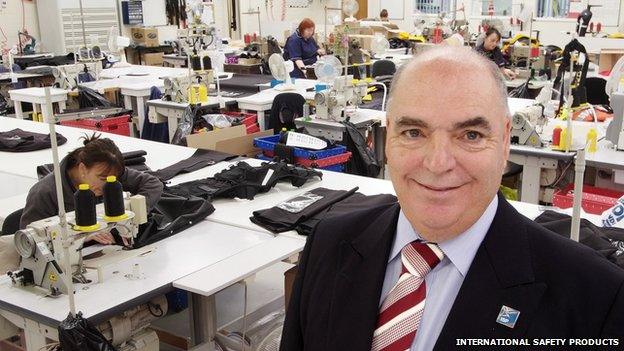
Geoff Billington says curbing the free movement of labour would have a "negative impact"
For Geoff Billington, sales director for International Safety Products (ISP), one of the world's largest life jacket manufacturers, the new government's demands to curb EU immigration are a concern.
"Curbing free movement of labour could have a negative impact on our business and possibly make us less competitive," he says.
About a quarter of ISP's staff are immigrants from countries like Poland, Lithuania, Hungary and Romania, he says, and they are prized for their machine skills and work ethic. Not being able to employ such workers could also put the wage bill up, he believes.
ISP sells about 70% of its output to Europe, and the single market presents "no barriers to entry for us. If we left, we could suffer from protectionism."
Mr Billington would even be happy for the UK to join the euro to remove exchange rate risks, he says. But he does want reform - anything that can stabilise the exchange rate - and the UK's contribution to the EU pot to be reduced.

International Safety Products makes life jackets and other safety equipment

Name: Nadeem Raza
Position: Chief executive
Company: Microlise, based near Nottingham
Size: £30m annual turnover; 300 employees

Nadeem Raza thinks the referendum introduces unnecessary risk for his business
"We would prefer the referendum not to be happening," says Nadeem Raza, boss of Microlise, a medium-sized business making the technology that monitors lorry fleets.
More than half its products are exported to Europe and other markets abroad.
"A lot of our contracts are four-to-seven years long, so we're committing to pricing and servicing levels now when we don't know what's going to happen after 2017. That's a lot of risk we could do without," he says.
"We'd rather things stay as they are until we have a really good reason to change it."
His customers, mostly supermarkets and delivery companies with large lorry fleets operating throughout Europe, would certainly benefit from greater pan-European standardisation, he believes.
Leaving Europe would make this much more difficult.

- Published12 May 2015
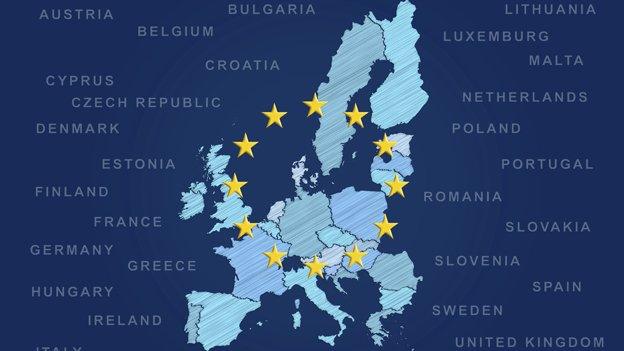
- Published17 February 2016
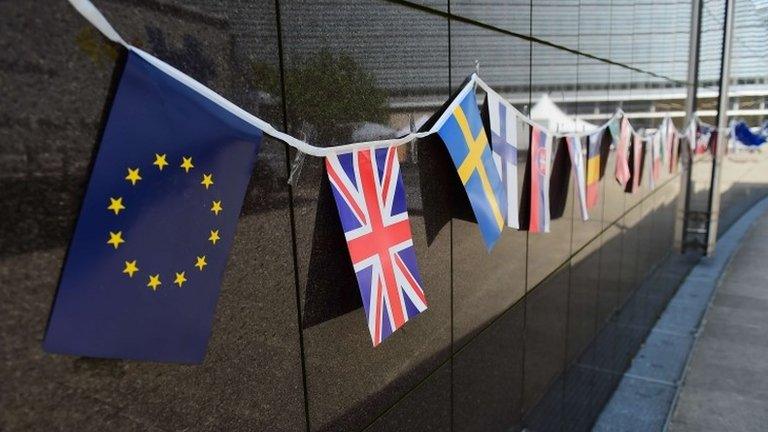
- Published12 May 2015
